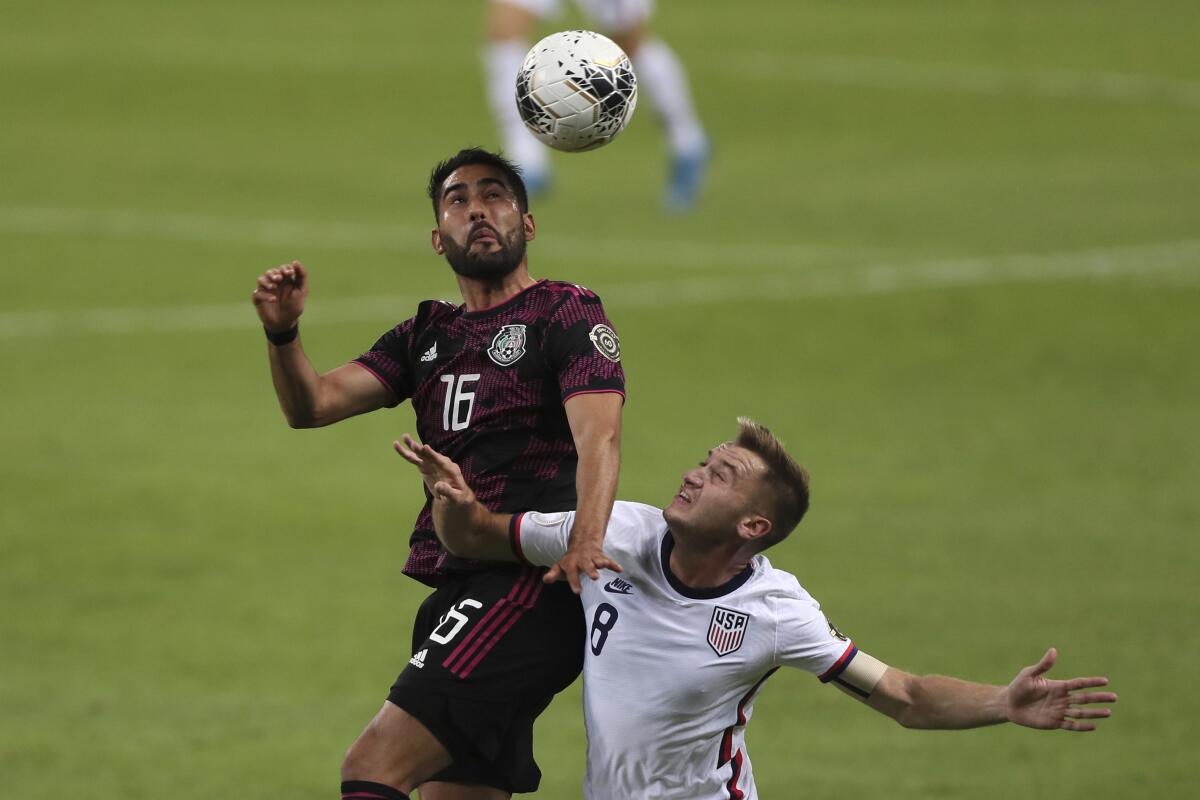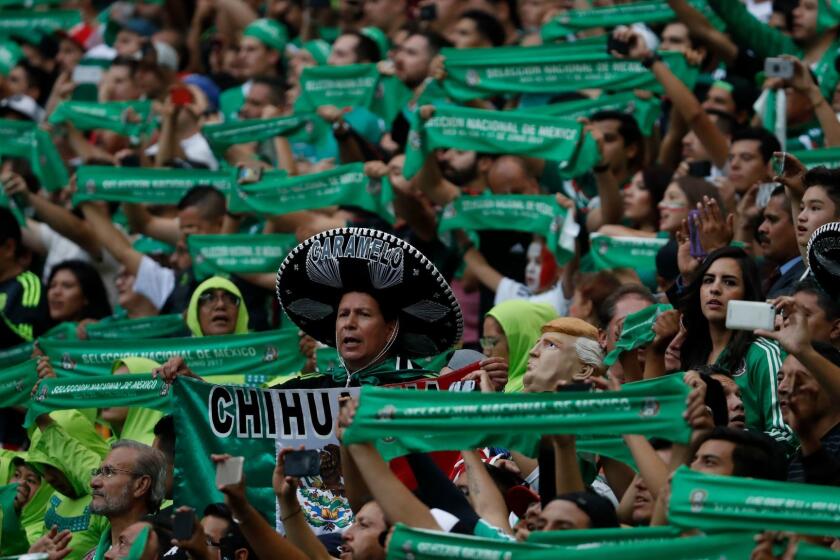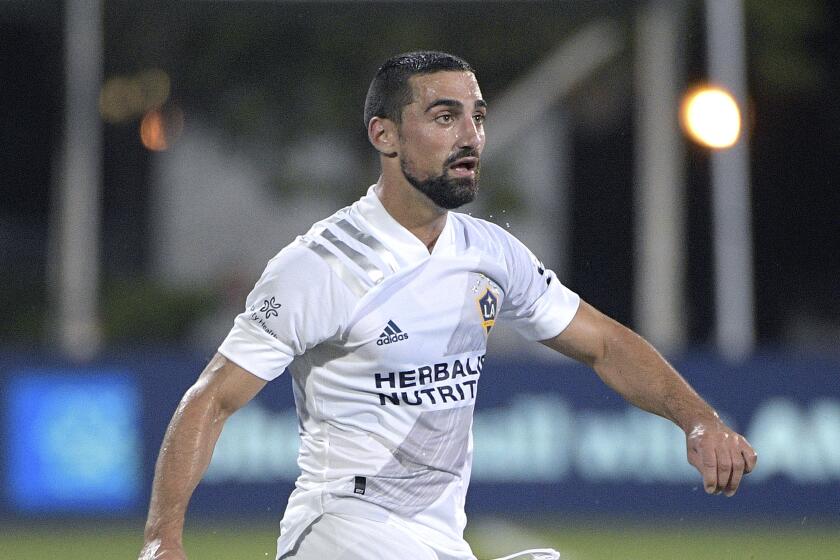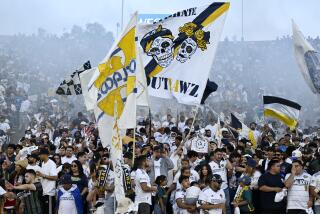Exclusive: Mexican soccer federation warns refs may halt play if fans use anti-gay slur

- Share via
The Mexican soccer federation has for years asked its fans to refrain from using a wildly popular anti-gay chant, both during games of the domestic Liga MX and internationally when the country’s national team was playing. Now it’s getting some high-powered help from FIFA, the world governing body for soccer.
Nearly two years ago, FIFA approved a disciplinary code that allows referees to end matches if fans use chants or display behavior deemed to be homophobic or racist. However, because of COVID-19, Mexico’s national team has played few games in front of fans since the rules were adopted.
But when the team returns to the field May 29 to face Iceland in Arlington, Texas, Yon de Luisa, the Mexican federation’s president, said the new code will be strictly enforced. The game, Mexico’s first in the U.S. in 20 months, will also be the first of as many as 14 games El Tri will play in the U.S. this year, a schedule that includes friendlies, the four-team Nations League finals, the CONCACAF Gold Cup and World Cup qualifying.
“There’s a couple of campaigns,” De Luisa said. “The first one is letting [fans] know the possible consequences. And the second one is letting our fans know that this is not the behavior, this is not the image, that we want to show from Mexico.”

Members of Pasión 1927, a Los Angeles-based fan group of the Mexican national soccer team, share their thoughts on a popular chant that is widely considered homophobic.
The FIFA guidelines involve a three-step process. At the first offense, officials are to stop the match and request a public-service announcement calling on spectators to cease the discriminatory behavior. If the behavior continues, the match can be halted again and the players can be sent to their locker rooms.
If play is halted a third time, officials are instructed to abandon the match. In addition, fans identified by security or other spectators as having used the chant can be ejected from the stadium.
The federation, along with Soccer United Marketing, which promotes Mexico’s games in the U.S., will be releasing educational social-media posts in specific markets ahead of the upcoming matches.
“This time is different because of the changes with the FIFA disciplinary code,” De Luisa said. “This time the sanctions are for real.”
They’ve been begged by star players to stop it, fined repeatedly, and threatened with dramatic sanctions that could hurt their national team’s chances in the World Cup.
The procedures have been in use in Liga MX games for about 18 months and the results have generally been positive, De Luisa said. But the chant returned briefly during Mexico’s games at the Olympic qualifying tournament in Guadalajara in March.
In a competitive game, continued use of the chant could result in a forfeiture while the abandonment of a friendly match, such as the one with Iceland, could cost a team valuable points in the FIFA world rankings, which help determine seeding for tournaments such as the World Cup.
Mexico is currently ranked 11th in the world.
In the past, FIFA fined national teams over their fans’ persistent use of the chant. Mexico, for example, was fined nine times during qualifying for the 2018 World Cup — the Mexican federation appealed some of those penalties. Fifteen other national federations were also fined by FIFA over their fans’ use of homophobic cheers during World Cup qualifying four years ago, but the fines were so small they had little effect.
MLS suspends Galaxy’s Sebastian Lletget for two games after review of his use of a homophobic slur in video posted on social media.
When the chant returned during Mexico’s tournament opener in Russia, FIFA threatened to ban Mexican fans from the World Cup and the behavior stopped.
The origins of the chant are hazy, but it is believed to date to a Mexican club match in 2007 and is generally used when the opposing goalkeeper makes a goal kick. There is vigorous debate over whether the chant is offensive since the offending word is said to have many meanings in Spanish, one of which is a derogatory slur used to demean gay men.
De Luisa said that conversation is meaningless.
“It’s not the intention with which you shout or with which you chant. It’s how the other [people] receive it,” he said. “If anybody feels it’s a discriminatory act, then it is not something that we should include in a conversation. That is no longer a debate. If it is discriminatory, we should avoid it.”
Earlier this spring, Galaxy midfielder Sebastian Lletget was suspended for two games by MLS after he posted a video to Instagram in which used the same offensive term during a playful exchange with a teammate. Lletget quickly took down the video and apologized.









